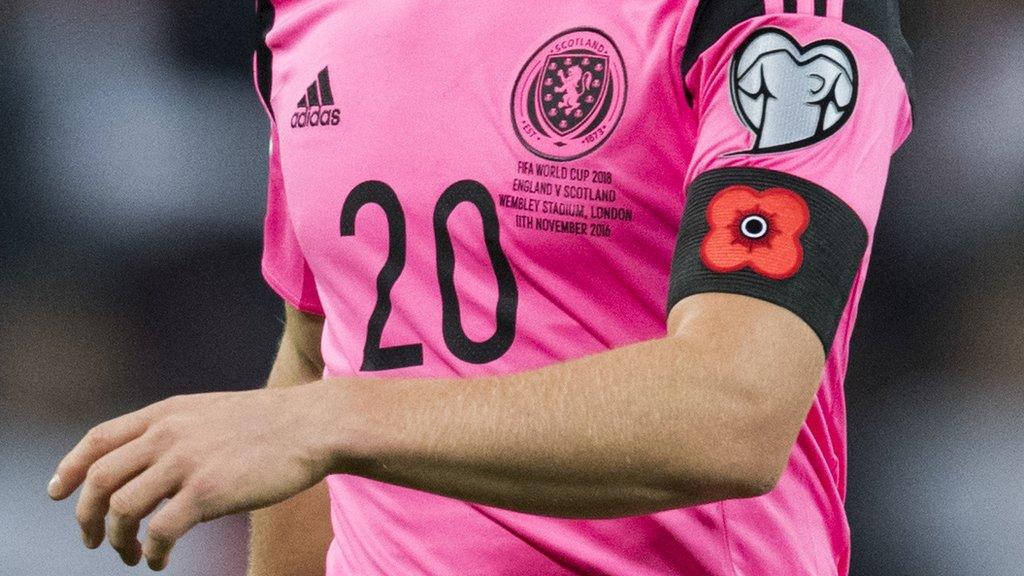Celtic: Upbringing crucial for manager Brendan Rodgers
- Published
Brendan Rodgers: Talent alone is not enough
We're only talking a year, but it seems like a whole lot longer.
Twelve months ago only three points separated Celtic from Aberdeen at the top of the Premiership table. That's a trippy thought when you look at that table now and the 27-point gulf that exists between the same two clubs.
Close to this time last year, the Dons beat Ronny Deila's team at Pittodrie, but it wasn't a revelation. Ross County had beaten Celtic the week before and had dumped them out of the League Cup. Motherwell had beaten them a while before that. Rangers would do it months later and remove them from the Scottish Cup.
Everything was in flux then. There was weakness where now there is only strength. On Thursday afternoon, Brendan Rodgers moved from room to room at Lennoxtown on his busy press conference beat.
He's in flying form. When he reaches us he talks about Carnlough in Antrim, where he was reared, and Ballymena, 25 minutes inland, where he was educated. Same school as Liam Neeson, the actor. Same town as Willie John McBride, the rugby icon. "Some big men there," he smiles. "Bigger than me."
Well, yes and no.
Your parents are your best teachers
When doing research on Brendan Rodgers you have to get through some amount of eulogies from his brief reign at Celtic - the players he improved, those he brought in and made stars of, the unbeaten run, the tactical wit, the authority, the positivity, the trophy already won, the league as good as won and the Scottish Cup to play for, continuing at the weekend with a tie against Inverness.
Dig deeper and you find the stuff from before, mention after mention of psychology, self-improvement. The tenets of his philosophy.
"It probably comes from growing up," he says. "My parents were about being the best they could be." He lost them far too soon, his mum, Christina, aged 53 and his dad, Malachy, just 59.
"It was borne out of a childhood growing up with really positive parents who made you feel you can achieve things with hard work. You have teachers at school but your best teachers are your parents, they're your role models. They worked for everything. Five kids, and we didn't have a lot of money, but we were rich in the values they gave us."
Malachy Rodgers was a painter and decorator, a stand-up guy, a rock.
"I remember leaving home as a 16-year-old going to England to start an apprenticeship as a footballer and when I came back at the end of the year I thought I'd be having a relaxing time.
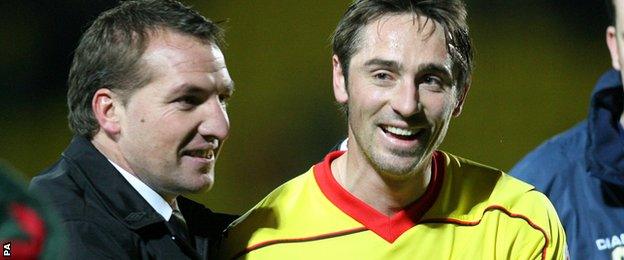
December 2008: Manager Brendan Rodgers celebrates with Watford skipper Tommy Smith after a win over Norwich City
"The next day I had to paint the wall out the front of the garden. It was those little bricks that were out in the 1980s that had all the designs and I had to do one side and then the other side and it felt like that was my holiday gone. But I had to help him.
"He was a worker, he liked his sons to work and I like my teams to work. For me, it's an obligation, it's not a choice. My father loved seeing skilful football. He loved teams that played with that panache, that charisma, that arrogance, but he would reference the best players and say, 'Look at how hard they work'. That was probably something I was picking up on as a kid. It becomes ingrained in you."
It was a life lesson that still has a meaning every day.
At 20, Rodgers' playing career ended through injury. Another massive landmark on his road to Glasgow. He was a father, a man in need of money but with few options to get it.
"That was the making of me. When I was a young player and I had to quit, at the time academies weren't around so there weren't many jobs in football. I always wanted to coach but I had a family and I had to provide for them. So I got a job with John Lewis in their main warehouse in Bracknell while I was doing my coaching badges.
"I'd be up at five o'clock in the morning and doing a 12-hour shift, five days a week and after that I went coaching. I knew what I wanted to do."
Dedryck Boyata? In the gym past midnight

Brendan Rodgers hopes striker Leigh Griffiths can improve aspects of his game
Last week Rodgers spoke about the psychology of footballers. It was part of a discussion about Leigh Griffiths' plight this season and the things he needs to do to get better. Rodgers is a big fan of the striker, but wants to see him develop a mentality to match his talent.
"With Scottish, and Irish players, it's just letting them know that they've been given a talent and when you're young you can get away with just talent. You can be the quickest boy in school, the strongest, the most skilful, but as you progress into your professional life it's about talent plus the hard work. The talent alone at this point will be no good for you.
"What happens sometimes with young Scottish and Irish players that I've seen and worked with is other things come into their life and they become wasted talents. With wasted talents what you get is they still play but they blame everyone else.
"It's not about Leigh. I'm talking generally. I have a real good relationship with Leigh, he's brilliant for me and he's a big part of what I'm doing here. But I want him to be the best he can be. What I'm challenging him to do is look at how you are in every facet of your life as a professional. If we can change a little that might actually change a lot.
"It's just making players aware that you can improve, you can improve tenfold in terms of what you are and it starts with how you approach your life as a footballer, how you apply yourself to diet and nutrition. We're trying to build a consistent Champions League club here so you have to have a Champions League mentality.
"If you don't, it's OK, I don't lose sleep over it, there'll be somebody else to come and fill your place."
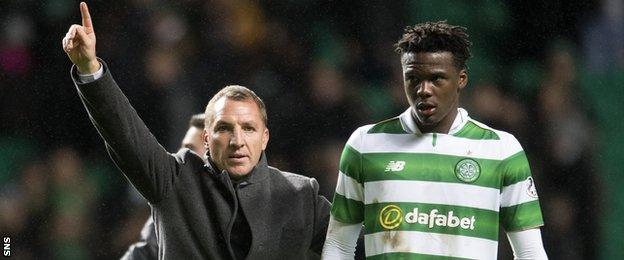
Dedryck Boyata has worked his way back into the Celtic first team under Rodgers
He tells a story of a conversation he had with a player, a 25-year-old whose identity he doesn't reveal. "I said, 'You've got 10 years left as a footballer. You've virtually only got 120 pay packets left - that's it. And that's if you look after your body.
"So, OK, it might not have gone quite right for you up until 25 but between now and 35 you've only got 120 pay packets and that's to do you for a lifetime. So can we now apply ourselves better and that'll improve you as a player and you might just get a little hike in those pay packets for you and your family?' It's reality."
The example in all of this is not any of the superstars Rodgers coached at Liverpool. No, it's Dedryck Boyata.
Rodgers has a world of time for the centre-half and the way he knuckled down when he lost his place at Celtic. "When he wasn't in the squad for games he'd come back here (Lennoxtown) and he'd be working in the gym to midnight and beyond so when his chance came he was going to be ready. I always say to them, 'The door will open for you, just be ready to come through it'."
It was like when Santa brought me the Celtic jersey
Even though he's only 44, Rodgers has known all sorts of different pressure in football management. At Watford, it was the stress of a relegation battle, which he won. At Swansea it was about defying the odds and taking the club to the Premier League. At Liverpool it was about trying to restore greatness - or even relevance - in the Premier League title race.
In all those jobs he was up against bigger opposition, so the burden was different to the one he carries now. He's the big beast these days. So where's the drive coming from?
"It goes back to what I said at the start - to be the best you can be. I need pressure and there's a different pressure here compared to my other jobs, but it's a big pressure. It's a different feeling when you're managing a club that you supported as a child.
"I walked in here on my first day and getting ready to train, I stood and stared at my kit with the Celtic badge. It didn't feel like work any more. This felt like a passion and a dream. So just pulling on the training kit for the first time felt like when I first put on my Celtic kit that Santa brought when I was younger.
"I know what I'm representing here, worldwide. I'm loving every minute of it."
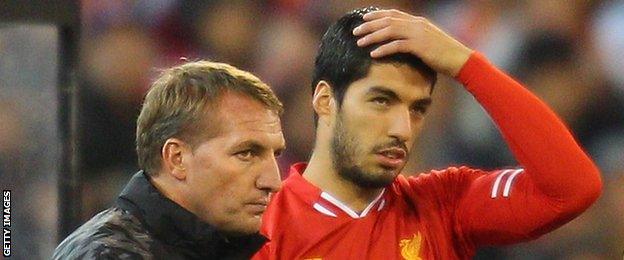
Luis Suarez was a prolific scorer for Liverpool while Rodgers was in charge at Anfield
He gets asked about his next move quite a bit. Once he's hoovered up everything in Scotland and has made more progress in Europe, is a return to England inevitable? And when does he make that return?
There's always a straight bat applied to that one. He doesn't make those kind of plans any more. "I'm very happy in my life - my personal life and my professional life. I never tend to put a timeline on anything like that.
"I'll never forget when I was at Liverpool. I signed a new deal supposedly to be the architect of a club going forward. That was in the June and in the September people were calling for me to get the sack. So you learn to stay calm.
"I can never promise I'll be here for the next six months, six years, one year. I just try to enjoy every single day. All I ever think about is how to be the best I can be for Celtic."
His parents' mantra. It's still in him, now and for ever.
- Published9 February 2017
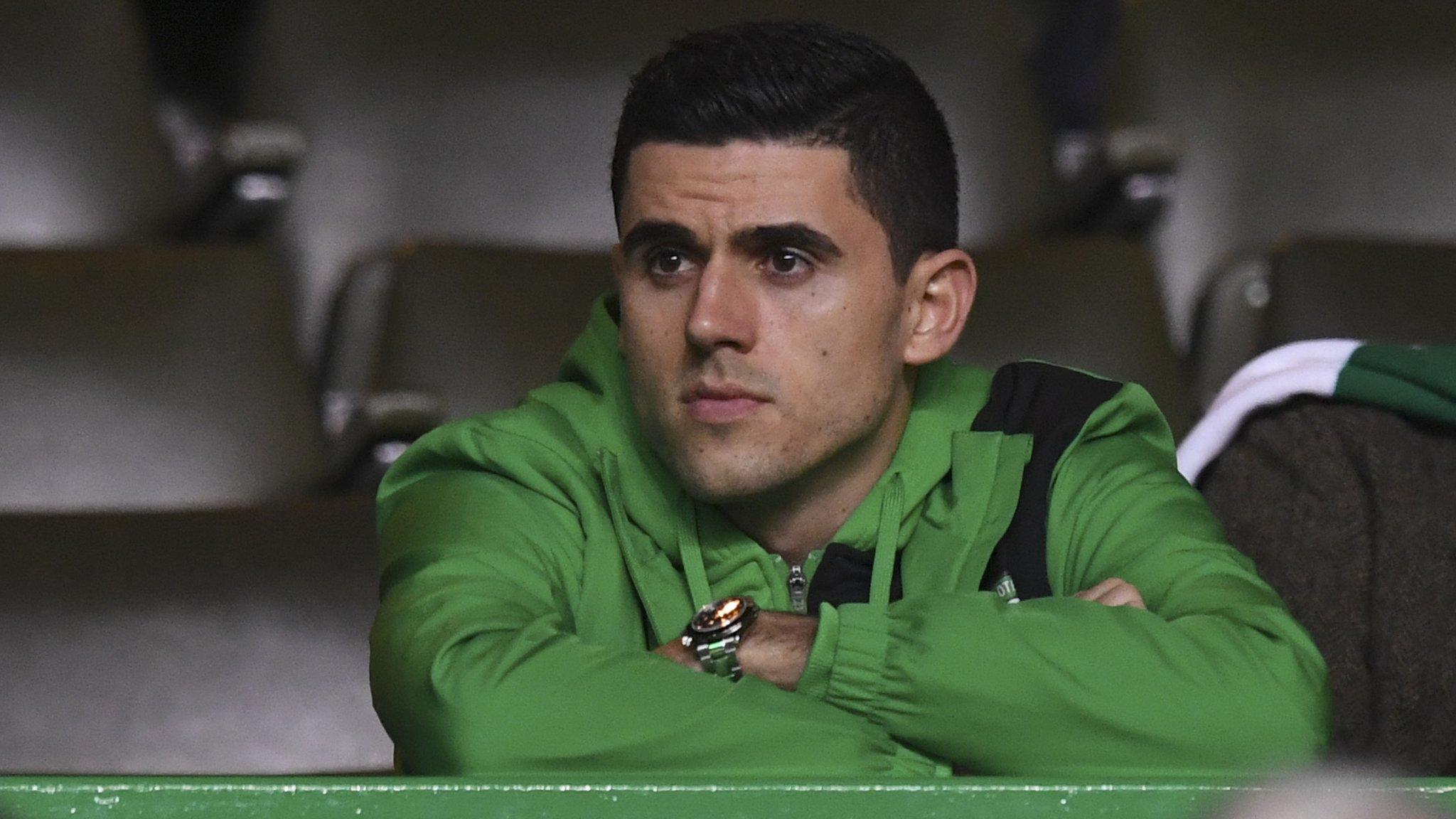
- Published9 February 2017
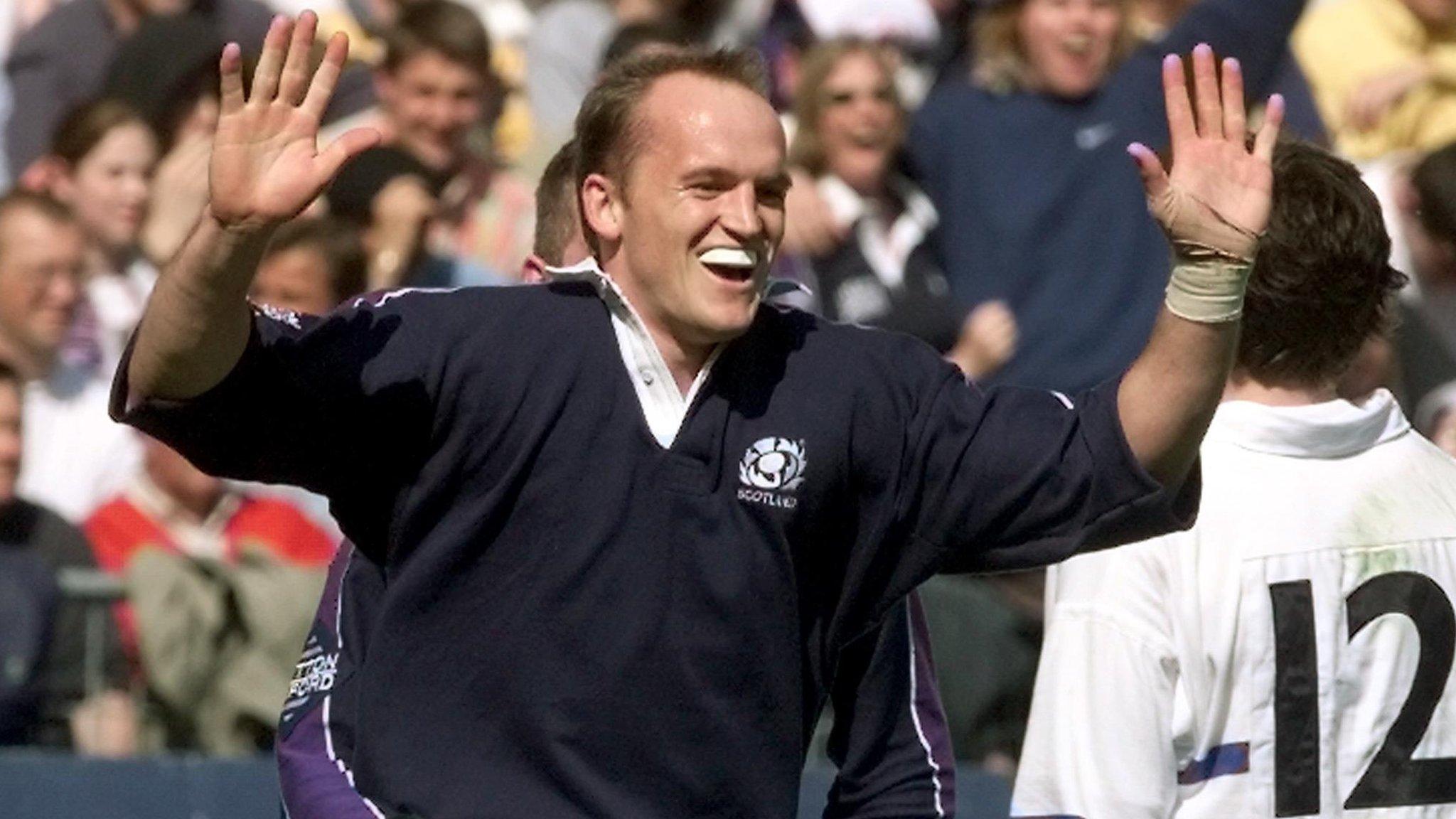
- Published10 February 2017

- Published9 February 2017
